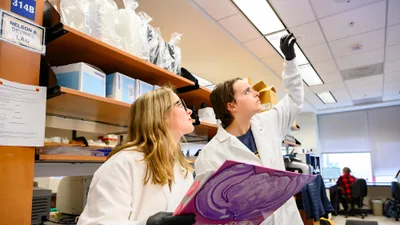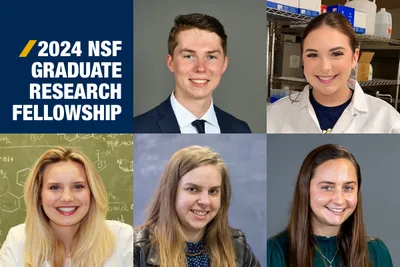Eberly News

For WVU ethics officer, research integrity is a question of values
In June, research ethicist Trisha Phillips held a training session with a group of West Virginia University students.
“I asked what they’d learned from the reading,” Phillips recalled. “One student raised their hand and said, ‘I hadn’t understood that there are authorship standards and norms,’ such as guidelines determining the order in which names of authors of an academic paper are listed.
“The student thought that was entirely up to their advisor. For them to know there are standardized practices was empowering. It helped them understand how research is done, what it means to be listed as an author.”
That’s what it’s all about for Phillips. As a scholar, she focuses on research misconduct and norms or best practices, and she teaches political science at the WVU Eberly College of Arts and Sciences. In her role at the WVU Research Office, Phillips promotes research integrity at the University.

WVU biologist to study genes laying framework for whole body regeneration
A West Virginia University biologist is studying why some animals can regenerate while others cannot and has identified the genes that play a role in the process.
Christopher Arnold, assistant professor of biology at the WVU Eberly College of Arts and Sciences, will explore how genes establishing animal body plans — the structure of organs and tissues — also set the stage for regenerative abilities.
His research could provide insight into human development and disease, leading to enhanced understanding of factors underlying tissue regeneration and inspiring novel approaches to improving human health.

Money trees: WVU researchers looking at local benefits from climate change fighting ability in Appalachian forests
Researchers at West Virginia University are working to ensure small landowners and local communities, instead of large corporations, profit from the ability of Central Appalachian forests to remove greenhouse gas carbon dioxide from the atmosphere.

WVU geologist says Yellowstone hydrothermal explosion is not indicator of larger eruption
A West Virginia University researcher says Tuesday’s (July 23) surprise hydrothermal explosion at Yellowstone National Park’s Biscuit Basin doesn’t mean a larger eruption of the Yellowstone Supervolcano is imminent. The explosion, captured on video by park visitors, launched debris into the air and damaged the boardwalk, but no one was injured.

New research unlocks the genomic mysteries of Parasitic Orchids using historical collections
Natural history collections provide irreplaceable resources in many arenas, both scientific and societal. These collections, including the WVU Herbarium, provide information on biodiversity, ecosystems, species distributions, climate change, and most recently, genomes.

WVU research reveals patterns behind armed conflicts, bolstering national security
West Virginia University research is strengthening national security by ensuring policymakers, military institutions, think tanks, academics and journalists have access to substantial, up-to-date information on international conflicts when they need it. A $555,647 grant from the National Science Foundation supports the three-year expansion of the Correlates of War Project’s Militarized Interstate Dispute Data, led by Vito D’Orazio, associate professor of political science and data sciences at the WVU Eberly College of Arts and Sciences.

WVU expert on rural Appalachia champions coalition building and local knowledge
Research from a West Virginia University scholar of rural Appalachia shows how even the most marginalized communities can assert power and create change when they come together to form coalitions.

Acclaimed WVU astrophysicist elected to elite National Academy of Sciences, a first for the University
Maura McLaughlin, Eberly Distinguished Professor of Physics and Astronomy, has been selected as a new member of the National Academy of Sciences, one of the highest honors in the scientific world. She is the first WVU researcher to join the prestigious group.

WVU neuroscience students pioneer new frontiers in undergraduate research
As Jayla Boyd and Lillian Floyd would describe it, they were in uncharted territory when they arrived on the West Virginia University campus for Brain Camp. By the end of the week, the soon-to-be high school seniors had discovered the complex world of neuroscience and were hooked.

Five WVU students named prestigious NSF Graduate Research Fellows
Two Eberly College students have joined an elite group of researchers who’ve been awarded the National Science Foundation Graduate Research Fellowship, a program aimed at supporting graduate education in STEM-based fields.
